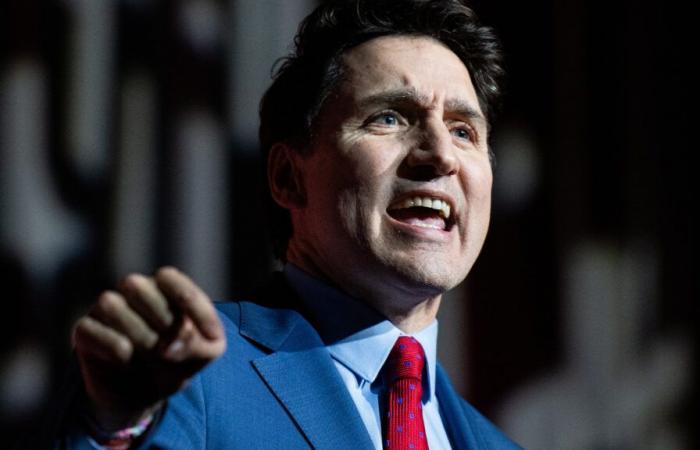Very low in the polls, with 2025 set as an election year and no sign of a Liberal recovery on the horizon, Justin Trudeau faces a key moment where he must decide whether to stay or leave.
Here’s a look at some of the scenarios and possibilities the Liberals now face:
Cabinet reshuffle
Carlene Variyan of “Summa Strategies,” a former senior Liberal aide, said a lot depends on what the prime minister does “in the next 24 hours.”
See also – The fall session ends in turmoil for the Trudeau government
She said if Justin Trudeau wanted to remain prime minister, he should take steps to shore up his cabinet as soon as possible and shore up the Canada-U.S. relations team by showing he is shifting toward the relationship with Donald Trump.
“He must signal to his cabinet, to the caucus and to the country that he remains firmly in control of his government,” she said, adding that Prime Minister Trudeau must also replace the ministers who announced month that they would not show up again.
Behind-the-scenes rumors in Ottawa political circles about an imminent cabinet reshuffle as early as Wednesday have died down after Ms. Freeland’s sudden resignation from cabinet on Monday.
The Liberals may now be waiting for tensions to ease before reshuffling their front bench and appointing new ministers to deal with the new Trump administration, which threatens to crush Canada with tariffs of 25%.
Ms. Variyan said Justin Trudeau should not wait.
“If he can bring this renewed sense of stability and control to his government … he has a real chance of being able to keep the government together until the spring,” she said.
Otherwise, caucus members and cabinet ministers could start “stepping down much sooner than that” and Parliament could collapse “shortly after their return at the end of January.”
Trudeau resigns
The House of Commons has put its tools aside for the holidays and will not resume its work until January 27, after the presidential inauguration of Donald Trump.
If Justin Trudeau resigns, that gives him until mid-to-late January to take his famous “walk in the snow,” as his father did, and think about passing on the reins of Liberal leadership.
Former Conservative House leader Peter Van Loan said what happens next is entirely up to Mr. Trudeau.
“I honestly believe that one of the reasons he’s hanging on is because he’s way behind in the polls and he doesn’t want to be seen as having been pushed out. But that just fuels this environment where he seems to be hunted.”
Mr. Van Loan sees the prorogation of Parliament and the resignation of Justin Trudeau in January as the most likely scenario, although nothing is set in stone.
“He will stay as leader of the party until his successor is chosen and the party chooses its successor, I don’t know, at the end of May or June,” suggested Peter Van Loan, then “nothing happens until until a new leader is in place.
The party’s national board would appoint an interim leader until the party’s base elects a new one and sets a date for the race.
In this case, the Liberals should really hurry up. The party would likely seek to book space and hold a race in much less time than previous leadership contests allowed.
Party leaders are also expected to manage the race amid significant rule changes introduced under Justin Trudeau that have radically expanded the Liberal Party’s base to anyone who wants to sign up to become a member, making it more than just a club exclusive to paying members and card holders.
Trudeau remains in power
Prime Minister Trudeau may attempt to continue his mandate as usual and stay in power until the scheduled election date in the fall, when the Liberals may have a better chance of winning the election if the cost of living and other accessibility issues are improving.
He can stay in power since his party did not adopt a formal mechanism to oust its leader, as the Conservative Party did when it passed the Reform Act, which ultimately led to the Conservative caucus getting rid of from former leader Erin O’Toole. But he would have a much harder time keeping his job if enough members of his own caucus asked him to resign.
In this scenario, the ruling party plans to wait as long as possible, hoping that voters will be less dissatisfied with Justin Trudeau’s brand image.
For this to work, New Democrats would need to continue to support the government for the duration of the current minority Parliament.
NDP Leader Jagmeet Singh this week demanded that Mr. Trudeau resign, and his parliamentary leader, Peter Julian, threatened in an interview on the show “Power and Politics” to overthrow the government in a vote of confidence in February or March if Justin Trudeau remains at the helm.
This could lead to elections around March, if the party follows through.
House Leader Karina Gould pointed out during question period Tuesday that the NDP has supported the Liberals in every confidence vote in the fall session, even as recently as last week.
Early elections
The next federal election is currently scheduled for the end of October, but the Trudeau government could stumble upon confidence votes in the House of Commons and trigger one sooner.
These votes take place on spending issues, like the budget and the fall economic statement, and the government has a lot of control over when these votes take place.
But the opposition can offer its own votes of confidence on special days called opposition days or opposition days — which the government has some flexibility in scheduling. Up to seven such days must take place between now and the end of March, according to House of Commons rules. These do not have to be motions of confidence.
An election could be held in winter, spring or summer if the Conservatives, Bloc and NDP reject the government on any of those votes — but they all have to come together at the same time to do it.
Once that happens, the campaign period must be at least 37 days, but no longer than 51 days, according to an Elections Canada backgrounder. Election day must always fall on a Monday.
Extension
In any of the scenarios Mr. Trudeau faces, he could choose to hit the pause button on Parliament by proroguing. He could make a request to the Governor General while the House is in session, or when it is adjourned for vacation.
An extension would allow the government to avoid confidence votes that could topple the government and trigger early elections.
And it would buy enough time for a leadership contest if Mr. Trudeau resigns, but it would have to be short.
Thomas Hall, a former procedural clerk of the House of Commons, said there is a time limit that accompanies this measure. Parliament should resume its work a few months later to continue providing the government with the funds necessary for its functioning.
That’s because once in the past, former Prime Minister Brian Mulroney had prorogued Parliament before its scheduled reopening in February 1989, leaving it closed from December to April and leaving it to the Governor General to approve spending current through special mandates.
Former Liberal MP Peter Milliken decided this created a political accountability problem, so he championed a private member’s bill that requires Parliament to return to vote on providing funds to the government.
Mr. Milliken’s successful strategy for changing the rules in 1996 means that Mr. Trudeau cannot prorogue Parliament to avoid an election during the entire spring session.
Privilege debate
The House of Commons was paralyzed for most of the fall, unable to pass most of the government’s bills due to a debate over privileges and parliamentary obstruction over the release of documents in a ethics and expenses scandal.
“If they prorogue now, any new session they start will not be subject to a filibuster debate. It would be over,” Mr. Hall said. The opposition could also try to revive this debate.
Mr. Hall believes Speaker Greg Fergus made a misstep in handling this debate, and could have recently ended it quickly if he had passed another round of procedural steps in the House.
“Unless they change the rules, they’re going to find themselves in the same situation pretty quickly,” he said, meaning the spring session could end up just as crippled as the fall session. .
“In order to avoid having other opposition days where (the government) would be defeated and where it would still be faced with the privilege motion, I think they have no choice but to prorogue. »






